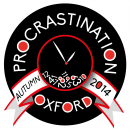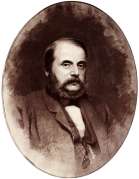I never put off till tomorrow what I can possibly do—the day after. —Oscar Wilde
It’s been called many things: a sin, an addiction, a disease, a devil. Estimates suggest that 80-95% of college students engage in it, and 20% of people are chronic sufferers. For Samuel Taylor Coleridge, surveying the wreckage of his life, it was ‘a moral idiocy, an imbecility of the will, a haunting, an emptiness, a posthumous state.’ For Abraham Lincoln’s wife it was her ‘evil genius’. For Thomas de Quincey it was worse than murder. Even Radio 4 wrings its hands.
Lust? Morphine? Bad language on the Sabbath day?
We mean, of course, procrastination. It is ubiquitous—perhaps especially among academics and writers. Yet for all the Wildean witticisms it has inspired, procrastination has remained remarkably understudied. The vast majority of existing works are, unsurprisingly, prescriptive: it’s a dirty word. There even exists a support group, Procrastinators Anonymous.
Over the last year we five organizers have enjoyed many fruitful discussions on different aspects of procrastination. We swiftly realized that each of our disciplines—literature, history, philosophy, politics, and internet studies—had much to contribute.
Existing analytical studies are largely confined to behavioural economics and psychology. The humanities and social sciences have been delayed arrivals on the analytical scene. Yet many of the most curious aspects of procrastination are not well captured by economics or psychology. Its study is necessarily interdisciplinary.
First of all, the English language is unusual in having a word for the phenomenon. Proverbs against procrastination exist in many languages—but without any single-word equivalent. Nonetheless, similar concepts and debates can be found outside the Anglophone world, like Goncharov’s Oblomov (1859) or the francophone writings of the Egyptian-born Albert Cossery, the ‘patron saint of laziness’. Speakers of Indian English have coined a new word, ‘timepass’, while Arabic has the nebulous taswīf. Is procrastination a precise and uniquely anglophone concept, then, or a cultural universal?
Similarly, what is the relationship between procrastination and its (typically unpleasant) conceptual and psychological bedfellows, from laziness and hesitation to boredom, fear, and disgust? The concept of postponement has always appeared morally fraught—amongst classical authors delay had both its defenders (Herodotus) and detractors (Cicero).
By the time it entered the English language in the sixteenth century, however, the connotations of procrastination had become almost chronically negative. Preachers railed against it, while in 1742 the poet Edward Young coined its enduring epithet: ‘procrastination is the thief of time’. Today self-help literature propagates ideals of risk-taking and ‘going with your gut’, with the procrastinator the entrepreneur’s miserable inverse. Is it coincidence that condemnation of procrastination has increased alongside the rise of the factory, the office, and most recently the ‘portfolio career’?
Yet we are also living in the age of the phone, spam, the open-plan office, and YouTube cat videos. The modern state is often criticized as dilatory and inefficient; the bureaucracy’s expansion informed the discovery of Parkinson’s Law (‘work expands so as to fill the time available for its completion’). The boundaries of private life bleed into the workday and the public sphere through flexi-time and social media. Does the organization of modern life inevitably foster procrastination even while denouncing it?
 Procrastination still has its defenders too, as a critical component of contemplation and creativity (for Einstein and Bertrand Russell, among others). This subculture even has its own magazine—published only once a year, of course.
Procrastination still has its defenders too, as a critical component of contemplation and creativity (for Einstein and Bertrand Russell, among others). This subculture even has its own magazine—published only once a year, of course.
As this suggests, procrastination is political. Through quiet disobedience and work-to-rule strikes, it can act as a ‘weapon of the weak’ against everyday exploitation (James C. Scott), or even as part of a revolutionary ‘right to be lazy’ (Paul Lafargue). At the same time it may stall radical change through tactical filibustering and bureaucratic inertia. Does procrastination have genuinely radical political potential, or is it an enforcer of the status quo?
It is with such open questions that the 2 July conference, and now the Autumn 2014 seminar series, begin. Moving beyond self-help prescription or narrow models of irrationality, we seek to explore the historical, social, and cultural dimensions of procrastination.
We welcome contributions from all disciplines and fellow-travellers in mapping this most pervasive and ambivalent of phenomena. Take a look at our call for papers, and get in touch.



2 thoughts on “Manifesto”